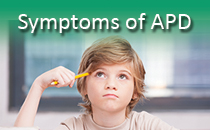Challenging the “Normal Hearing” Myth
When it comes to hearing, the results of a standard hearing test might not tell the whole story. The truth is, normal hearing test results do not always guarantee normal hearing. 
Auditory Processing Disorder (APD) is a condition that often goes undetected in traditional hearing tests, and it’s easy to overlook. In fact, approximately 12% of adults with normal pure-tone thresholds report significant hearing difficulties, which are frequently dismissed as insignificant issues when the results of a hearing test are “normal.”
An audiogram, which is the standard hearing test, assesses your ability to hear different pitches, but it doesn’t examine how your brain processes sound. APD, on the other hand, stems from faulty neural pathways connecting your ears to the auditory processing centers in your brain. This affects the brain’s abiltiy to analyze and process sound effectively. Consequently, APD can have a profound impact on your ability to recognize subtle sound differences, comprehend and process speech efficiently, filter out background noises, and retain information you’ve heard.
In many cases, APD can mimic hearing loss and have adverse effects on communication, learning, and social interactions, especially in noisy or multi-talker environments. So, if you’re an adult with a normal or near-normal audiogram who struggles to understand speech, particularly when there’s background noise, you might be dealing with a hidden auditory processing disorder.
Testing Beyond the Surface for Real Insights
Auditory processing evaluations go beyond standard hearing tests, assessing various auditory skills to examine your brain’s ability to process sounds effectively. Our comprehensive evaluations are designed to pinpoint your specific processing deficits, providing crucial insights that guide the development of personalized treatment plans. It’s important to note that auditory training can benefit individuals of all ages, regardless of their intellectual abilities, co-existing conditions, or audiogram results.
Symptoms Adults with APD often experience:
- Difficulty understanding conversation.
- Challenges with conversation in noisy environments, such as restaurants.
- Trouble dividing attention (e.g., talking on the phone while tuning out background noise).
- Difficulty comprehending fast speech.
- Struggles with following long conversations.
- Difficulty understanding without relying on lipreading or facial cues.
- Challenges with unfamiliar accents.
- Preference for high television volume and/or subtitles.
- Difficulty with teleconferences.
- Feeling exhausted from straining to follow conversations.
- Needing more time to process information heard compared to others.
- Difficulty remembering information long enough to write it down.
- Misinterpreting the intent behind a person’s comments, such as sarcasm or tone of voice.
- Easily distracted by sounds that others don’t notice, like tapping or pen clicking.
- Struggles with understanding music lyrics or distinguishing between melodies.
- Challenges with reading comprehension, both currently and in their earlier years.
Auditory processing disorder can cause significant challenges in daily life, impacting more than just communication. The frustration from frequent misunderstandings can affect self-esteem and relationships. The constant effort needed to process sounds can lead to mental fatigue and decrease cognitive resources for other tasks, ultimately affecting workplace performance by making it difficult to filter distractions, multitask, and concentrate. People might avoid social gatherings due to the fear of feeling embarrassed, leading to feelings of isolation and loneliness. When they are unaware of the reasons behind their struggles, they may attribute their difficulties to personal failings or a lack of intelligence, potentially leading to depression. However, with the correct diagnosis and tailored treatment, adults can build confidence in listening and learning situations and reach their full potential.
Complete our Free Online Questionnaire
You can now complete our free online Adult Auditory Performance Scale to assess self-perceived listening abilities across multiple areas. This is a useful tool for evaluating self-perceived hearing problems to determine if you are at risk for a hidden auditory processing disorder. Click Here to Complete our Free Adult APD Symptoms Questionnaire.
Telehealth and In-Clinic APD Evaluations
APD Testing: If you find yourself experiencing these difficulties in speech comprehension, especially in noisy settings, it is imperative to look beyond a basic audiological evaluation to uncover the source of this “hidden” hearing problem. An APD evaluation administers a battery of tests to assess the integrity of your central auditory nervous system. If weaknesses are identified, it’s not too late to seek help.
We are pleased to offer telehealth evaluations for Auditory Processing Disorder (APD) to residents of Mississippi, Alabama, Florida, and Louisiana. If you are located in these states, we can schedule a virtual evaluation to assess your auditory processing needs. For individuals outside these states, our online auditory training programs and therapy options are available regardless of your location.
Interested in an APD evaluation? Get in touch with us today!
Treatment Options for Adults with APD
Treatment for Auditory Processing Disorder (APD) in Adults: Adults with APD can benefit from deficit-specific auditory processing therapy and hearing assistive technology, such as low-gain hearing aids for auditory processing disorder and/or remote microphone systems. In-person therapy, teletherapy, and self-paced online therapy programs are also available and can be beneficial. It’s essential to tailor the treatment approaches to specific types of auditory processing deficits. For those who have not undergone a full auditory processing evaluation but wish to enhance their listening skills, there are convenient at-home, on-demand auditory training programs available. This can be a valuable starting point for adults with APD who do not have access to providers offering auditory processing therapy. While digital tools can be helpful, it’s important to note that they cannot replace the value of human connection and the expertise of a skilled professional providing personalized care.
Overwhelmed by noisy environments?
Our self-paced therapy programs are designed to help you thrive in challenging listening situations, one step at a time.
Advantages of starting with self-paced therapy programs:
- Convenience: Work on your own schedule from the comfort of your home.
- Immediate Support: Start improving your auditory processing skills right away.
- Affordable: A cost-effective alternative to traditional therapy.
- Evidence-Based: Programs designed by experts in APD therapy.
LACE AI Pro
Auditory Processing Center is a licensed and certified LACE AI Pro clinic. LACE AI Pro is a self-administered program designed to enhance auditory training through listening exercises using artificial intelligence (AI) technology. It can be accessed from the comfort of your home through a mobile app, providing convenience and flexibility as you work through the listening exercises at your own pace. LACE AI Pro is backed by 20 years of peer-reviewed research on using this cutting-edge technology to teach patients to listen with their brains, not just their ears. The program features clinically proven listening exercises to help improve cognition, working memory, and communication in challenging listening environments. In this updated version, LACE AI Pro features advanced capabilities and a modern interface designed to be easily accessible and engaging, using adaptive exercises that automatically adjust the difficulty as the listener progresses. Exercises include speech-in-noise practice, rapid speech exercises, auditory memory and working memory exercises, and speech-reading exercises, using a variety of content topics such as headline news, Bible trivia, and jokes. The program offers a one-time subscription for a lifetime membership with unlimited content to target key listening comprehension skills.
Additionally, LACE AI Pro also supports multiple languages. It also now has a voice cloning feature that allows a specific talker, like a grandchild, to provide a sample of their speech, and the program will generate their voice for the activities. The avatar-driven feature is a personal trainer, guiding the listener to better listening comprehension abilities. The program includes a companion app for the user’s significant others, allowing them to provide feedback.
At this time, LACE AI Pro is only available in the United States.
Interested in LACE AI Pro? Contact us for a free 7-day trial!
APD Support On-Demand Auditory Training
APD Support is an on-demand auditory training program developed by Angela Alexander designed to improve auditory skills at home. The program is based on Jack Katz’s Buffalo Model Therapy and focuses on four key skill areas: phoneme training, phonemic synthesis, speech in noise, and auditory memory. It provides step-by-step training on phonemes to clarify unclear sounds, exercises to improve the blending of phoneme sequences through listening, auditory memory with working memory exercises, and activities to enhance word recognition in noisy environments. The APD Support On-demand training program is suitable for adults and children aged 12 and above who may not have access to in-person or virtual therapy due to cost or accessibility constraints. However, it’s important to note that as a prerecorded curriculum that is an independently administered program, it is not as personalized as in-person training and does not address all aspects of APD.
Interested in on-demand auditory training? Please contact us to discuss your needs and get started.
Contact us to learn more about auditory processing disorder in adults or to schedule an evaluation.




